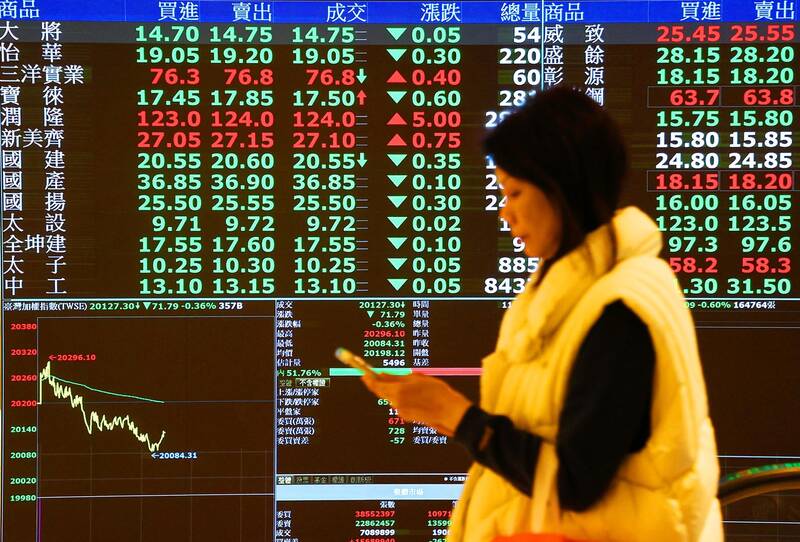The TAIEX yesterday plunged 3.81 percent, or 774 points, to 19,527.12 after Taiwan Semiconductor Manufacturing Co (TSMC, 台積電) on Thursday trimmed its forecast for global chip demand this year and an apparent Israeli retaliation against Iran added to the jitters.
TSMC would keep its capital spending unchanged, but expected global chip demand to increase at only 10 percent due to lukewarm recovery in personal computers and smartphones and an expected decline in the auto industry, the company said.
The guidance disappointed Wall Street, triggering a 4.86 percent fall in American depositary receipts overnight and a 6.72 percent tumble in the local bourse yesterday, Taiwan Stock Exchange (TWSE) data showed.

Photo: CNA
“TSMC unveiled on-par financial results, but investors are looking for more exciting guidance,” Cathay United Bank (國泰世華銀行) chief economist Lin Chi-chao (林啟超) said.
The company stood by an earlier estimate of a 20 to 25 percent pickup in annual revenue, but looked at a profit erosion of 0.5 percentage points from electricity rate hikes.
The lackluster outlook set off corrections in the company’s share price, which still retained 26.48 percent growth this year despite softening to NT$750.
TSMC dragged the TAIEX by 464 points, or 60 percent overall, due to its hefty weighting, Chung-Hua Institution for Economic Research (中華經濟研究院) vice president Wang Jiann-chyuan (王健全) said.
Asian bourses all took a hit, as the drone and missile exchanges between Israel and Iran heightened worry over broad regional military conflicts, Wang said.
Turnover inflated to NT$704.79 billion (US$21.68 biliion) after foreign portfolio managers oversold local shares by NT$85.75 billion and domestic proprietary traders cut positions by NT$22.39 billion net, the TWSE tally showed. By contrast, mutual funds overbought by NT$8.29 billion.
The local currency shrank NT$0.136 versus the US dollar to an eight-year low of NT$32.512, suggesting fast and panicky capital outflows, the central bank said on its Web site.
TWSE and the Financial Supervisory Commission sought to calm public unease by saying the government should step in to support local shares when compelling and non-economic external factors strike.
Listed companies last quarter posted total revenues of NT$9.53 trillion, rising 5.4 percent to the second-highest in history for the same period, the local bourse said, indicating that Taiwan is still on a course of steady recovery.
Local firms would distribute decent cash dividends this year, although their prices have climbed considerably, it added.

Hon Hai Precision Industry Co (鴻海精密) yesterday said that its research institute has launched its first advanced artificial intelligence (AI) large language model (LLM) using traditional Chinese, with technology assistance from Nvidia Corp. Hon Hai, also known as Foxconn Technology Group (富士康科技集團), said the LLM, FoxBrain, is expected to improve its data analysis capabilities for smart manufacturing, and electric vehicle and smart city development. An LLM is a type of AI trained on vast amounts of text data and uses deep learning techniques, particularly neural networks, to process and generate language. They are essential for building and improving AI-powered servers. Nvidia provided assistance

DOMESTIC SUPPLY: The probe comes as Donald Trump has called for the repeal of the US$52.7 billion CHIPS and Science Act, which the US Congress passed in 2022 The Office of the US Trade Representative is to hold a hearing tomorrow into older Chinese-made “legacy” semiconductors that could heap more US tariffs on chips from China that power everyday goods from cars to washing machines to telecoms equipment. The probe, which began during former US president Joe Biden’s tenure in December last year, aims to protect US and other semiconductor producers from China’s massive state-driven buildup of domestic chip supply. A 50 percent US tariff on Chinese semiconductors began on Jan. 1. Legacy chips use older manufacturing processes introduced more than a decade ago and are often far simpler than

STILL HOPEFUL: Delayed payment of NT$5.35 billion from an Indian server client sent its earnings plunging last year, but the firm expects a gradual pickup ahead Asustek Computer Inc (華碩), the world’s No. 5 PC vendor, yesterday reported an 87 percent slump in net profit for last year, dragged by a massive overdue payment from an Indian cloud service provider. The Indian customer has delayed payment totaling NT$5.35 billion (US$162.7 million), Asustek chief financial officer Nick Wu (吳長榮) told an online earnings conference. Asustek shipped servers to India between April and June last year. The customer told Asustek that it is launching multiple fundraising projects and expected to repay the debt in the short term, Wu said. The Indian customer accounted for less than 10 percent to Asustek’s

Gasoline and diesel prices this week are to decrease NT$0.5 and NT$1 per liter respectively as international crude prices continued to fall last week, CPC Corp, Taiwan (CPC, 台灣中油) and Formosa Petrochemical Corp (台塑石化) said yesterday. Effective today, gasoline prices at CPC and Formosa stations are to decrease to NT$29.2, NT$30.7 and NT$32.7 per liter for 92, 95 and 98-octane unleaded gasoline respectively, while premium diesel is to cost NT$27.9 per liter at CPC stations and NT$27.7 at Formosa pumps, the companies said in separate statements. Global crude oil prices dropped last week after the eight OPEC+ members said they would